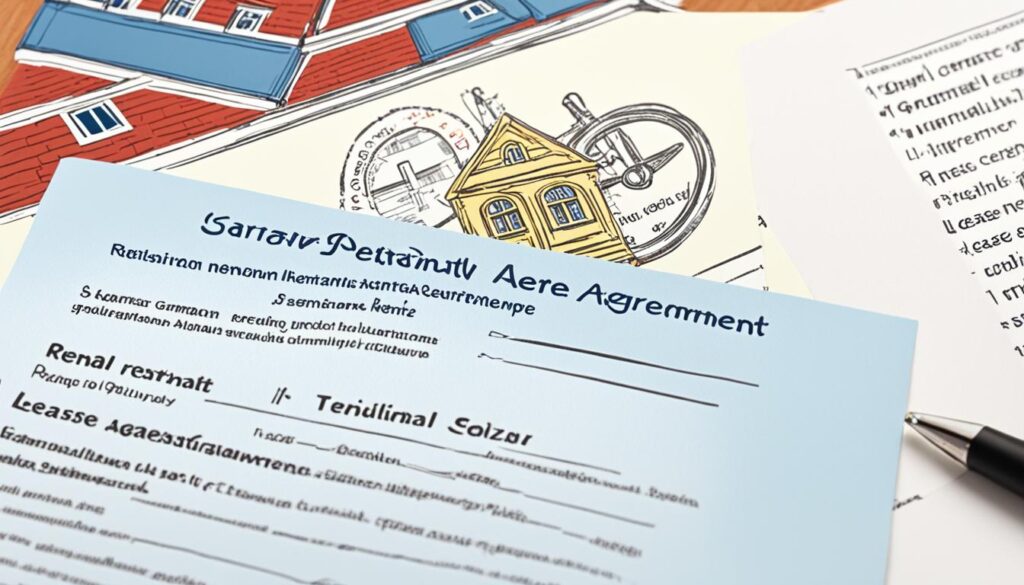Renting in Germany can be an exciting yet intricate process, marked by numerous rules and regulations that every tenant should understand. This guide aims to equip you with essential knowledge about tenant rights in Germany, including rental agreement guidelines, the nuances of different types of rental contracts, and the obligations of landlords. Familiarizing yourself with these components is crucial for navigating the rental landscape successfully and ensuring a smooth transition into your new home. With deposits that can reach up to three months’ rent and notice periods varying based on your tenancy duration, being well-informed will protect your interests under the renting laws in Germany1.
Key Takeaways
- Understanding your rights and obligations is crucial for a successful rental experience.
- Rental agreements can vary significantly, so knowing the details is essential.
- Deposit requirements are often significant, usually amounting to three months’ rent.
- Notice periods can differ based on the contract type and length of tenancy.
- Landlords have limited grounds for terminating leases, which must be documented.
- Utilizing reputable sources can make your apartment search more efficient.
Unlock Investment Opportunities Abroad!
Understanding Tenant Rights in Germany
In Germany, understanding the legal protections for tenants is crucial for anyone navigating the rental market. The comprehensive regulations under the German Civil Code (BGB) offer robust safeguards, ensuring fair treatment and security for tenants. One of the key aspects is that landlords must provide a minimum notice period of up to three months before eviction, and termination of a lease can occur only for specific reasons, thus ensuring tenant rights in Germany are prioritized23.
Legal Protections for Tenants
Renting laws in Germany include established protocols for legal protections that tenants can rely on. Landlords are obligated to maintain rented properties, addressing issues promptly. Tenants have the right to withhold rent if essential repairs are not completed, reinforcing their legal standing in disputes4. The Mietpreisbremse, or rent brake, further helps in regulating rent increases in high-demand areas, which aids in keeping housing accessible2. Additionally, legal protections extend to privacy rights, requiring landlords to give notice before entering a tenant’s property, except in emergencies4.
Notice Periods and Evictions
Understanding notice periods is essential for both tenants and landlords. Standard notice periods in Germany typically start at three months; however, this can extend to six months for tenants residing for more than five years, or even nine months for those living in a property for over eight years23. This framework gives tenants a secure environment and fosters communication with landlords during potential financial hardships, aiming to reduce the risk of eviction4.
| Duration of Tenancy | Notice Period Required |
|---|---|
| Less than 5 years | 3 months |
| 5 to 8 years | 6 months |
| Over 8 years | 9 months |
For further details on tenant rights and protections, visit this helpful guide on tenant rights in2
Rental Agreement Guidelines

When renting in Germany, understanding the types of rental agreements is crucial for protecting tenant rights in Germany. The two primary types of leases are indefinite (unbefristet) and fixed-term (befristet). Indefinite agreements are generally more common, while a fixed-term lease must be justified by the landlord. Each type has specific lease requirements in Germany that enforce tenant security and contractual obligations.
Types of Rental Agreements
- Indefinite Lease: This type of agreement does not have a specified end date, allowing tenants to stay as long as they meet their obligations. It’s typical for tenants to give a three-month written notice to terminate this type of lease.
- Fixed-term Lease: These agreements are set for a specific period and can only be terminated early for valid reasons stated in the contract.
Understanding the differences between these contracts ensures compliance with the essential rental agreement guidelines, which safeguard the rights of tenants against unfair practices.
Unlock Investment Opportunities Abroad!
Key Elements of a Rental Contract
A well-structured rental contract includes several key elements critical for both parties. The identification of tenant and landlord, along with rental conditions, must be clear. Other vital components include:
| Element | Description |
|---|---|
| Rent Amount | Should specify the base rent and conditions for any potential increases. |
| Deposit | Typically, a rental deposit not exceeding three months’ rent serves as a safeguard against damages or unpaid rent. |
| Utilities | Details regarding the inclusion of utilities such as heating and cable services must be explicitly outlined. |
| Termination Clauses | Defines under what conditions the agreement can be terminated, ensuring clarity and comfort. |
| House Rules | Often includes noise restrictions and shared responsibilities for common areas. |
Remember, the guide offers comprehensive information on these rental agreement guidelines, which emphasize the importance of reviewing contracts carefully before signing. For further reading, refer to this detailed guide on rental agreements in Germany, ensuring you are well-informed of your tenant rights.
Renting in Germany Rules

Understanding the rules surrounding renting in Germany is essential for both locals and internationals. The process incorporates specific guidelines that govern rent increases and security deposits. Knowing these regulations can significantly affect how smoothly the transition into a new rental property goes.
Understanding Rent Increases
In Germany, landlords are restricted in their ability to increase rent. According to the rental property rules, a landlord cannot raise the rent during the first 12 months of a lease agreement. After this period, any increase is limited to a maximum of 15% over a three-year span. It’s important for tenants to stay informed about local rental statistics to ensure they are not subjected to unjustified hikes. Understanding these renting in Germany rules can provide leverage in discussions with landlords.
Security Deposits and Their Return
Security deposits in Germany typically amount to three months’ rent, which acts as a security measure for landlords. By law, these security deposits must be stored in a separate, interest-bearing account. At the end of the lease, landlords are required to return the deposit within 3 to 6 months, deducting only for any justified damages. This clarity about security deposits aligns with the general guidelines of rental property rules in Germany, ensuring both parties understand their rights and responsibilities. Ensuring that everything is documented can help expedite this process and affirm that the security deposits are handled correctly5.
Landlord Regulations in Germany
In the realm of landlord regulations in Germany, property owners play a vital role in maintaining the habitability of their rentals. They are legally bound to ensure that major repairs are completed promptly, while minor issues may be the responsibility of the tenants, as delineated in their rental agreements. Understanding these responsibilities is essential for both parties to uphold their tenant rights in Germany.
Landlord Responsibilities for Repairs
Landlords must address urgent repair needs to provide a safe living environment, and tenants can request these repairs professionally. If landlords neglect this duty, they risk being held accountable under residential tenancy laws Germany. Establishing clear communication regarding repair responsibilities in rental contracts can help prevent disputes and misunderstandings, ensuring a more harmonious landlord-tenant relationship.
Access Rights of Landlords
While landlords have the right to access their rental properties, they must do so for legitimate reasons, such as inspections or urgent repairs. Prior notification is typically required, allowing tenants to feel secure within their homes. Understanding your rights regarding landlord access is crucial, as these regulations foster a respectful and legally compliant atmosphere in which both landlords and tenants can thrive. For a comprehensive overview of these laws, refer to legal resources that delve into landlord obligations and tenant protections.
Comprehending landlord regulations in Germany, including responsibilities for repairs and access rights, is integral for a balanced rental experience. For detailed legal aspects of rental agreements, check the implications outlined in regulations such as the Mietpreisbremse affecting rental costs and tenant rights policies67.
Unlock Investment Opportunities Abroad!
FAQ
What are the main tenant rights in Germany?
How does the rental agreement process work in Germany?
Are there rules regarding rent increases in Germany?
What is the typical security deposit amount in Germany?
What responsibilities do landlords have regarding property maintenance?
What are the notice periods required for eviction in Germany?
Can landlords access the rental property without tenant permission?
What should a tenant do if they are facing financial difficulties?
Source Links
- https://aden-immo.com/en/landlord-guide/landlord-and-tenant-obligations-in-germany/
- https://www.expatrio.com/about-germany/renting-germany
- https://www.iamexpat.de/housing/rentals-germany/rental-contracts-housing-rights
- https://amberstudent.com/blog/post/understanding-tenant-rights-in-germany
- https://germanpedia.com/renting-in-germany/
- https://www.kaiserslauternamerican.com/german-rental-security-law-in-a-nutshell/
- https://conny.de/en/rent/rent-control/information

Comments